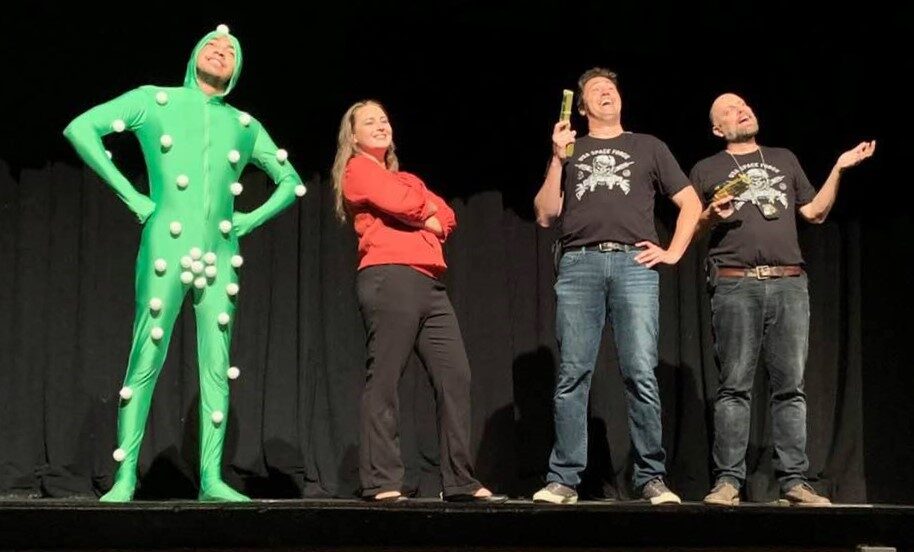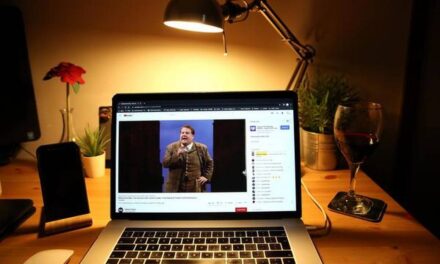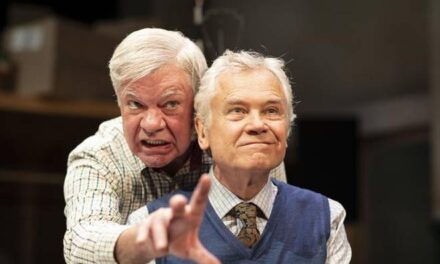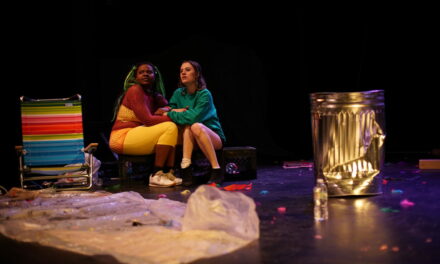The works of San-Diego-based theatre company Lonesome Whistle Productions thrive in the intersection of satire, improvisation, boundless imagination, and profound appreciation for innovative solo pieces and local talent. Following a successful run of SPACE FORCE! comedy at the San Diego Fringe Festival in 2019, actor, writer, and producer Tom Steward created a virtual year-long project Space Force: Quarantine. This anthology of short monologues is to be released on the last day of each month throughout 2021on YouTube, Facebook, and Instagram. Produced by Lonesome Whistle Productions, each monologue tells a new story of a different member of Donald Trump’s Space Force quarantined in outer space following an outbreak of The Moronavirus. The monologues are written, performed, and filmed by some of the best theatre artists in San Diego, including the actors from the original Fringe cast. Three artists of the Space Force: Quarantine participated in this conversation with The Theatre Times: Tom Steward, Julia Giolzetti, and Catherine Barnes.
Irina Yakubovskaya: How was the idea of this project born?
Tom Steward: We have done two fringe productions at the San Diego fringe festival in 2019. That’s where we started out. Since COVID quarantine and the shutdown of live arts, we have relocated online, and it encouraged us to be a little more unconventional because we had no choice. We were compelled to find formats and projects that were hybrid in nature. We are trying to use something that people see as a limited capacity of online theatre and use that as a plus by only devising work that belongs there [online]. Space Force: Quarantine! is a perfect example of that. I am always keeping Julia Giolzetti in mind for all the projects we do. I also wanted to get artists involved who write and create their own material. Julia has done a lot of self-production with her online Shakespeare project Sofa Shakespeare.
Julia Giolzetti: I know Catherine [Barnes] from middle school, actually. I met Tom at the Old Globe as part of the Playwrights project in San Diego. I am primarily an actor, but during quarantine, I lost all my jobs. I am obsessed with Shakespeare, so I put into the universe: Does anyone want to do Shakespeare with me? I got over a thousand responses in a day. I ended up compiling a full-length show from the fragments of submissions. Many countries and languages have been involved.
IY: The actual Space Force has been made fun of in the media. What is your rationale behind the timing of the Space Force–themed show?
TS: When the Space Force show was done originally two years ago, I was less involved in the writing of it. Immediately, we began to devise based on the idea that the Space Force sounded like a bad TV procedural. We wanted to do something theatrically that could simulate that idea of a Space Force as a TV show in the future about Space Force. We crafted a very self-reflective concept. The live audience was a studio audience of the TV show. That’s where it came from. We are in the post-Trump era now, that is why I brought the idea of quarantine as a framework to move the satire that’s implicit in the Space Force concept over to something that is more relevant and interesting. I have given actors and writers free rein on what they can talk about, so it could move potentially into various political topics. Space Force is a way of doing science fiction, and there is no requirement to do it as a satire or a comedy. It is Trump’s legacy, weirdly, so the Space Force is out there for parodists. As I was preparing the press materials for the project, I didn’t think it was going to be starting out during the first post-Trump days.
IY: The project takes place over time, over the course of one year. We live in a time when nobody can plan anything. Artists in particular cannot plan ahead for as much as a month, let alone a year. What was the reason for choosing such a format?
TS: I wanted to include more people than we had before. I also wanted to offer a realistic time frame for participants. It was also pessimistic, thinking about how in a year there will be life in a very modified form, and there will still be demand for the online version of theatre. Last year the online serial piece that I did was called The Godfather One Part. It was a burdensome process of creating many videos in a short span of time, even though at the time I was happy with the distraction. I certainly don’t want to put myself or other artists through that again. I also don’t really understand how audiences approach what we are putting out there. It is a different relationship. I don’t know if they want a daily or a monthly show. So, this project is very experimental, it explores the shift in the audience relationship to online theatre. With an anthology like this, with different performers every month, it helps with the variety. It is completely new territory. This format made sense to me. People don’t instantly watch the material when you put it out, but [gradually] they find it, they check it out, so an audience base is built over time. At the end of the year, we are going to have an hour worth of monologues. It is essentially going to be a full fringe piece, cumulatively. Or people can watch it for five minutes once a month.
IY: This process is not dissimilar to workshopping a piece over a year.
TS: We have given actors and writers a vague prompt, but I really don’t know what to expect. It is improv for cowards or delegated improv. I am conscious to give opportunities to many people, to put their work out there, but I am also taking advantage of that wealth of talent to create a coherent piece of theatre.
Catherine Barnes: I am very interested in this project because even though Trump is out of office, there is one-third of Americans who agree with the insurrection at the capitol, which is terrifying, chilling, and absolutely blows my mind. I am really interested to see Tom’s first monologue which will set the tone. I tend to do silly songs and parodies. I look forward to being able to use this satire vehicle. I will be doing probably a parody of Rocket Man or Space Oddity. I am a percussionist, so I will probably play the vibraphone which sounds pretty spacey. I am happy to work with other San Diego unique artists, [and highlight that] San Diego is not Los Angeles’s back yard.
IY: I agree. I think it is important to decentralize American theatre arts from the East and the West coasts, as well as big cities. Quality theatre happens everywhere.
TS: Online theatre is a great opportunity to take the regionalism out of theatre. We are not bound to having to be in the place where the show is. It is an opportunity to reach out nationally and internationally. It is cutting out the local middleman which hopefully means a lot of exposure for people doing work [outside of big cities].
JG: I grew up in San Diego, and I wanted to go to New York City. After graduating high school, I went to NYC for twelve years, and I had work, I was doing great. I couldn’t stop thinking about going back to San Diego, not only because I missed home but because there is something special about being in a place that feels like a local community. I feel great making theatre in San Diego, a place that does not usually have a voice in national or international theatre. I am hoping that because of this pandemic, something else will grow out of [the void of Broadway closures]. If this something will be more regions that end up like New York City and have more funding, more awareness of theatre [that would be great]. There has been more interest from the local press and media to see and write about the local theatre happenings.
TS: The quality of work becomes the selling point rather than the location. People are desperate for work that leans into being online, being filmed, rather than trying to hide the fact that it’s what we are doing. There is a scarcity of such work.
JG: It also helps you do things that you normally wouldn’t do. Tom has always talked about bringing Space Force back, but my character in the original production was a straight man running the experience that the audience was watching. This was not my typical lane, so I am excited to be able to have the medium that is a monologue for whatever character I can create. Part of the joy but also the envy of being the original Space Force was watching the main actors who are huge men do amazing physical comedy. By having this extremely weird world [as a predecessor to the monologues] there is a lot of room to play. Now, there is a little more exuberance and uplifting energy than when we did the original Space Force show two years ago.
TS: The format certainly allows you to experiment. You are not beholden to anything but an idea, which is “Quarantine in Space.” I think there will be a range in pieces, with people treating it as dystopian fiction as well as comedic takes that will find it quaint and outdated. I think both ends will come out.
IY: If you had one sentence to describe why the audiences should experience Space Force: Quarantine monologues throughout 2021 and beyond, what would it be?
CB: What could possibly be better than erogenous tentacles, space nausea, vibraphone, improv, comedy, and terror all rolled into one fantastic show?
JG: [This project has] all the things we have come to expect from living in quarantine: existential dread, excessive sanitizing, panic, fear, disease, and the omnipresent existence of death all around us at all times, but in Space!
TS: I am going to put my producer cap on and say: this is some of the best theatre talents that I know, creating an anthology of monologues that is completely original work, with a familiar concept. For me, that is the attraction. The body of work it is going to produce is going to be something to behold.
This post was written by the author in their personal capacity.The opinions expressed in this article are the author’s own and do not reflect the view of The Theatre Times, their staff or collaborators.
This post was written by Irina Yakubovskaya.
The views expressed here belong to the author and do not necessarily reflect our views and opinions.


















